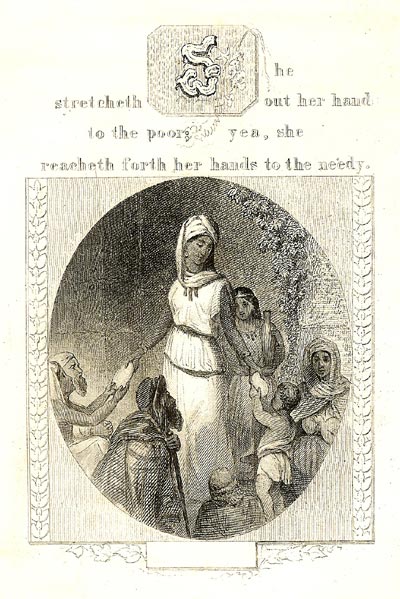*From The Excellent Woman of Proverbs 31 written in 1847 by Anne Pratt (1806-1893)

There is something very expressive in the figure of the text: "She stretcheth out her hand to the poor; yea, she reacheth forth her hands to the needy." It would seem to imply an attention to the wants of the poor, not forced upon her by immediate neighborhood. She waited not for the poor man to come to her door, but she went out to look for him.
She knew well that God loveth a cheerful giver. "When thou gatherest the grapes of thy vineyard, thou shalt not glean it afterwards; it shall be for the stranger, for the fatherless, and for the widow" (Deu 24:19-21).
The poor who were near her rejoiced in her bounty, and the poor afar off were not forgotten. Even so may we see the ripplings of the waters around the pebble which is cast into the stream; and the ridges of water are fuller and larger nearest to the stone, and though they lessen as they recede, yet they form widening circles still, until they enclose the whole lake: just so were the deeds of love wrought by this woman, fullest in the charities of home, yet widening ever, until they encompassed the whole world in their embrace.
SHE STRETCHETH OUT HER HAND TO THE POOR;
YEA, SHE REACHETH FORTH HER HANDS TO THE NEEDY.
YEA, SHE REACHETH FORTH HER HANDS TO THE NEEDY.
Proverbs 31:20

It would be impossible for any reader of the Holy Scriptures not to see how careful the great Jehovah has been to recommend to the care of the rich, the wants of their poorer brethren. The law of Moses abounded in humane institutions respecting the poor, and these would be familiar to the Jewish woman. Though her Bible had not the Gospels, with their illustrations of the living and dying love of the Redeemer; though the sacred volume of the ancient Hebrew told not of the self‐denying zeal of St. Paul, or other holy men of old, who lived and labored and suffered for others; though it had not the gentle and affectionate tenderness of the lovely and beloved disciple, yet its law made provision for kindness and humanity; and the poor and the destitute, the fatherless and the widow, were ever described as the peculiar objects of God's love and compassion,
There is something very expressive in the figure of the text: "She stretcheth out her hand to the poor; yea, she reacheth forth her hands to the needy." It would seem to imply an attention to the wants of the poor, not forced upon her by immediate neighborhood. She waited not for the poor man to come to her door, but she went out to look for him.
She knew well that God loveth a cheerful giver. "When thou gatherest the grapes of thy vineyard, thou shalt not glean it afterwards; it shall be for the stranger, for the fatherless, and for the widow" (Deu 24:19-21).
The poor who were near her rejoiced in her bounty, and the poor afar off were not forgotten. Even so may we see the ripplings of the waters around the pebble which is cast into the stream; and the ridges of water are fuller and larger nearest to the stone, and though they lessen as they recede, yet they form widening circles still, until they enclose the whole lake: just so were the deeds of love wrought by this woman, fullest in the charities of home, yet widening ever, until they encompassed the whole world in their embrace.
